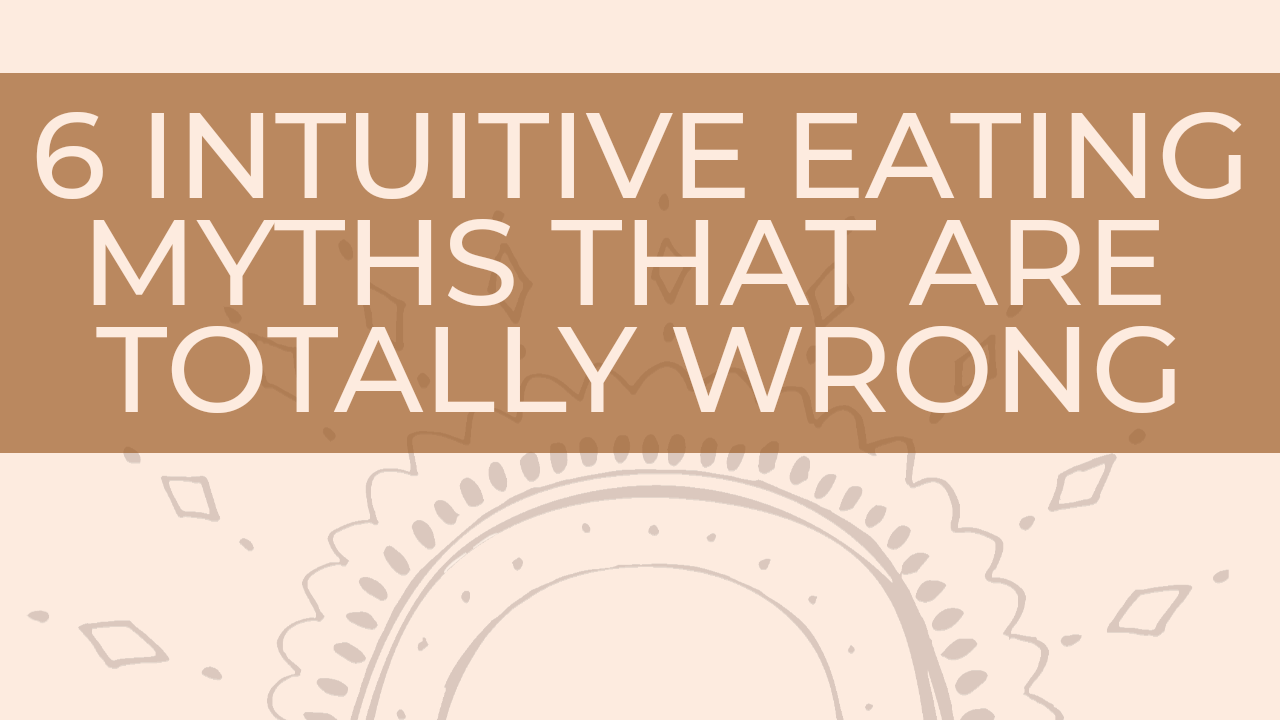6 Intuitive Eating Myths That Are Totally Wrong

This post is part of my Introduction to Intuitive Eating series. Check out “What is Intuitive Eating?” to start from the beginning.

1. If I give myself unconditional permission to eat anything at anytime, I’ll eat uncontrollably
When you have completely made peace with food and know that what you want will always be allowed, you’ll be able to stop after eating an amount that feels right for you. If you don’t fully believe you have unconditional permission to eat anything at anytime, intuitive eating won’t work because you will still feel a sense of deprivation. It’s normal to find yourself eating more of the foods you have restricted in the past. Your body is like “OMG I better stock up now before I’m not allowed to have this again”. However, once your body trusts that you won’t deprive it anymore, these foods will become a balanced part of your eating.
2. Intuitive Eating is a diet and I need to make sure I don’t fall off the wagon
Anyone else over the wagon analogy? It literally doesn’t even make sense but that’s a whole other topic. Anyways, when you treat intuitive eating as a diet, you will end up with the same consequences as dieting (low energy, feeling out of control around food, weight cycling, etc). I’ve had some people tell me that when they tried intuitive eating, they felt more inclined to weigh themselves. The reason for this is that they have not fully rejected the diet mentality and are approaching intuitive eating from an all or nothing perspective. Whenever you turn intuitive eating into something to “succeed” or “fail” at, you’re most likely engaging in the diet mentality. Which we know, results in preoccupation with food and weight and the dieting cycle continues. Intuitive Eating is flexible and allows for imperfection. It’s not “all or nothing” and there are NO FOOD RULES.
3. Nutrition and health don’t matter
The goal isn’t to see all foods as equally nutritious; it’s to have the same emotional response regardless of what you eat. Giving yourself unconditional permission to eat what you want ultimately results in variety and balanced food choices. You’ll want to feel good and feeling good comes with listening to YOUR individual needs. Our bodies have bio-individual nutrition needs and intuitive eating is what allows you to really listen to them.
Also, intuitive eating does not ignore your health; it actually improves it. The difference is that you approach your health from a place of self-care rather than self-control. Approaches to health that encourage body acceptance, listening to your body, and active embodiment instead of structured exercise are associated with statistically and clinically relevant improvements in physiological measures (e.g., blood pressure, blood lipids), health behaviors (e.g., eating and activity habits), and psychosocial outcomes (e.g.; self-esteem and body image).
4. You shouldn’t exercise
Exercise, or better referred to as joyful movement, can definitely be part of your life as in intuitive eater as long as you dissociate it from the pursuit of weight loss. The goal here is to think about movement from a place of self-care rather than self-control (yes, I know I’m a broken record with this phase but it is critical). Shift from focusing on burning calories or losing weight (or whatever diet mentality thoughts you have tied to exercise) and instead focus on how movement makes you feel. Ask yourself “Do I feel like moving my body or exercising? Do I need to rest or will movement feel good? What kind of movement would feel just right?”.
5. You can’t eat intuitively if you have a food allergy or celiac disease
You absolutely can eat intuitively if you have food allergies or other medical conditions. It all comes down to your mindset around your food choices. If you make a food choice because you genuinely don’t want to make yourself feel sick, then you’re coming from a place of self-care. But if you make a choice because you think you are bad, then you’re coming from a place of self-control. By no means am I recommending you to eat a food that is legitimately harmful to your body. It’s about connecting with your body and really listening to what’s going on so you can honor that in your food choices in a way that feels good and safe for you. @gofeedyourself wrote an awesome guest post on Rachael Hartley’s blog about intuitive eating for food allergies or celiac. She has celiac disease and gives you the low down on how she navigates it while eating intuitively.
6. I am ONLY allowed to eat when I’m hungry
Intuitive Eating is not a diet or another set of rules for you to follow. Although tuning into your body’s signals is an important part of intuitive eating, this does not mean that you can’t choose to eat something purely for its taste or pleasure, even if you aren’t hungry.
Also, it’s obviously important to develop coping mechanisms for difficult emotions outside of food but emotional eating is NOT THE END OF THE WORLD. It’s normal to eat emotionally sometimes and that is OKAY. Also, you’re much more likely to turn to food for comfort if you are preoccupied with thoughts about food and your body. So as you move away from thinking about your food and your body all the time, emotional eating naturally decreases.
Read the last post in this Introduction to Intuitive Eating series: 15 Reasons Why You Should Practice Intuitive Eating.
7 Days Of Alignment: Free Guide
7 simple daily practices to cultivate more alignment, inner peace and presence, starting today.
